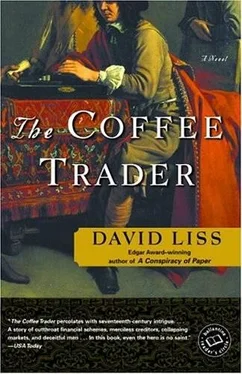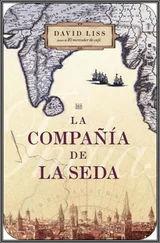When his father discovered that Miguel had been attending the secret synagogues, he called him a traitor and a fool. He locked Miguel in a room for a week with nothing but wine, some dried figs, two loaves of bread, and a chamber pot far too small for so long a duration. Later Miguel would find this choice of punishment horribly ironic, for it was his father the Inquisition had taken and locked in a prison and tortured-accidentally, they claimed-to death. He had been named by another Converso who, under the Inquisitor’s knife, had shouted any names he could recall, whether they be Christian, Jew, or Mohammedan.
Miguel had been three years gone by then, after a rupture with his father over his marrying a woman with an insufficient dowry. Miguel’s father had absolutely forbidden the marriage. Not only had Katarina too little money but her family consisted of well-known Judaizers who would bring down trouble on the rest of them. And, he insisted, she was far too pretty. “I don’t like to see you with so beautiful a girl,” he’d said to Miguel. “It’s unseemly for you to marry a better-looking woman than your father did. It makes you appear undutiful.”
Miguel was not so easily swayed by dowries, and he thought it perfectly seemly to marry someone pretty. But more than beauty, Katarina had possessed great understanding. Her family was devout, and she had an uncle who was a great Talmudist in Damascus. She understood Hebrew better than most men in Lisbon. She knew the liturgy and could keep a home in accordance with the holy writings. Miguel’s father had spat on the floor when Miguel announced that they had secretly married. “You’ll regret defying me,” he’d said, “and you’ll regret marrying a woman who knows how to read. I won’t say another word to you until you come to me and beg my forgiveness.”
Four months later, when Katarina had died of a sudden fever, they spoke for the last time. “Thank Christ that’s over with,” his father had said to Miguel at the conclusion of the funeral. “Now we can get you married to someone who will do our family some good.” Two weeks later, Miguel boarded a ship bound for the United Provinces.
While Miguel established himself in Amsterdam, his father and brother continued to export wine and figs and salt, but then the Inquisition arrested the elder Lienzo and everything came to an end. By Portuguese law, the Church could confiscate the material goods of anyone convicted by the Inquisition, so wealthy merchants made particularly popular victims. After suddenly expiring during a questioning session, Miguel’s father was found guilty posthumously, and the family business ceased to exist. Left with only a few items in his own name, Daniel had no choice but to leave Lisbon. Following his brother and the mass exodus of Conversos to Amsterdam had seemed the inevitable choice.
The Ma’amad had welcomed Miguel when he came to Amsterdam; its teachers helped him expand his understanding of the holy tongue, taught him the liturgy, and explained the holy days. Though still disoriented with grief for Katarina, those first few weeks had been full of excitement and learning, and though his circumcision was an event best not recollected too often, even that bloody affair had been moving. However, it was not long before he discovered that the council’s aid did not come without its price. The parnassim, the men who composed the Ma’amad, ruled absolutely, and those who would live in the community lived by their law or were cast out.
Two evenings after his meeting with Geertruid, Miguel had attended a study meeting at the Talmud Torah. Here was where the Ma’amad shone. Study groups met constantly in the synagogue’s cloistered chambers. Jews recently escaped from Iberia and the Inquisition, who knew nothing of their faith but that it was in their blood, learned how to conduct themselves, to pray, to live as Jews. In the next chamber wise men, the chachamim, argued details from the Talmud that Miguel did not believe he would ever begin to comprehend. He met with a group of men not unlike himself-returned within the past few years but dedicated to embracing the ways of their fathers. They read in Hebrew the weekly Torah portion and worked through its meaning while a chacham, who served as their guide, discussed the Talmud commentary.
Miguel loved these meetings. He looked forward to them all week. He had not the luxury to study quite so much Torah at home as he would have liked-though he did try to go to the early morning study sessions at least once or twice a week-and what time he did have he did not always use wisely. These meetings were therefore doubly precious. For the space of a few short hours he was able to forget that reckoning day crept cruelly toward him, and the brandy futures he’d bought so impulsively would make his debts even more hopeless.
In the halls of the Talmud Torah, just after his meeting, Miguel paused with his friend Isaiah Nunes to continue debate on the interpretation of a particularly thorny bit of Hebrew grammar. Nunes traded mostly along the Levant routes but had recently begun to expand into Portuguese wine. Having sampled too many of a buyer’s wares before the meeting started, he now argued loudly. His voice echoed off the high ceilings of the nearly empty synagogue as they made their way toward the exit.
Nunes was a large man, bulky without exactly being fat. Not yet thirty years old, he had already managed to establish himself as a man to be reckoned with in the Levant routes. Miguel liked the young trader, but there were limits to how much an indebted widower his age could like someone so young and successful. Almost by accident Nunes stumbled on lucrative deals; he invested cautiously but with obscene success; he had a beautiful and obedient wife who had given him two sons. However, these accomplishments were tempered by Nunes’s inability to take pleasure in anything he’d done. Growing up, he’d witnessed one relative after another taken by the Inquisition, and he’d become nervous by disposition. He regarded his success as a mere illusion, a trick of the devil aimed only to raise Nunes’s expectations before dashing them.
The two made their way out in the darkness, for only a few candles burned in the common areas. Nunes had been in the midst of a long harangue, half of which was pure nonsense, as he reasoned, backtracked, apologized for making little sense, and then demanded that Miguel agree with him. Then he stopped short and bent over.
“By Christ, I’ve just broken a toe!” he shouted. Like most Jews from Portugal, he cursed like a Catholic. “Miguel, help me along!”
Miguel bent to help his friend. “You drunkard, on what did you break a toe?”
“On nothing,” Nunes whispered. “It’s a ruse. Don’t you know a ruse when you see one?”
“Not if it’s a good ruse.”
“I’ll take that as a compliment, I suppose.”
“Now that we have established that you have only pretended to break your toe in order to fool me,” Miguel said quietly, “perhaps you might tell me why you would do such a thing.”
“By the Virgin,” Nunes cried out, “it hurts! Help me, Miguel!” In the dim light of sparse candles, Miguel could see Nunes close his eyes in a moment of concentration. “There’s a man lurking in the shadows by the door,” he added more quietly. “He’s been watching you.”
Miguel felt himself tense. A man lurking in the shadows awaiting him could never be good news. More than once he’d been spirited away to some dank tavern cellar by an angry creditor who kept him there as prisoner until he could send for the money he owed or-and this was more likely to happen-he could talk his way out of imprisonment.
Then another thought crossed his mind. Those strange notes he had been receiving. I want my money. He felt his skin prickle.
Читать дальше












